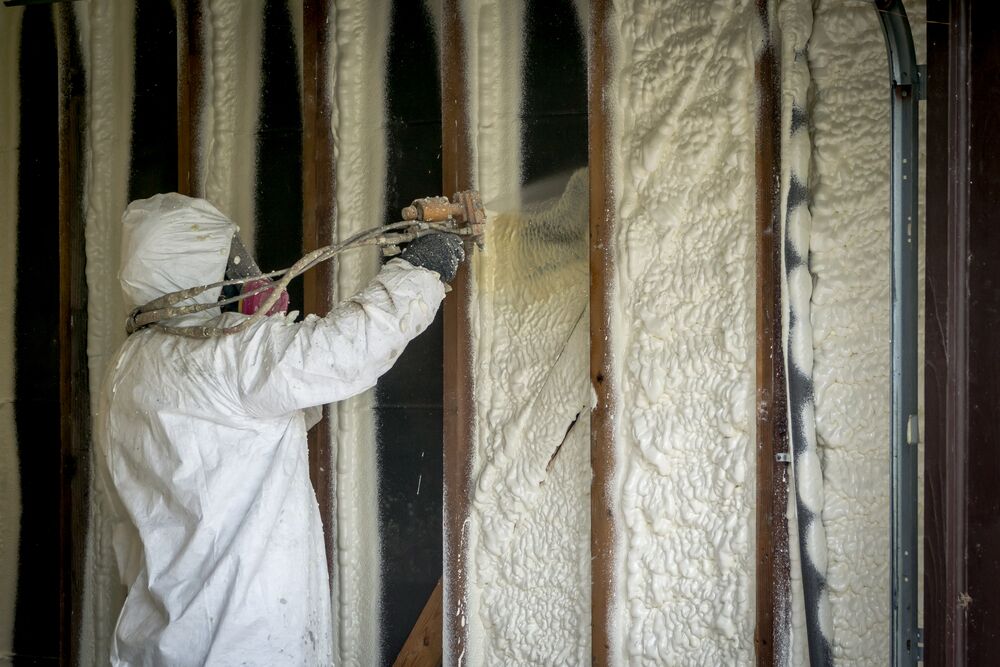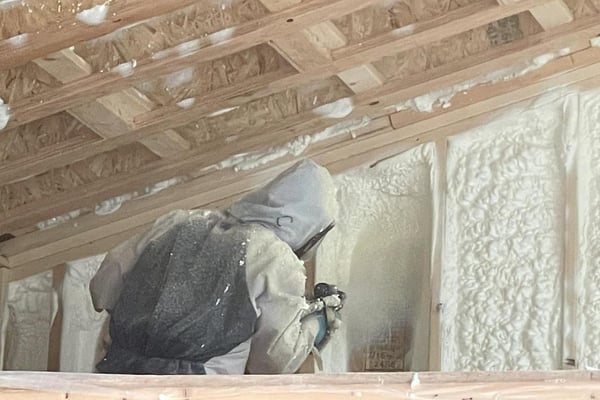Top Factors to Select Spray Foam for Your Following Insulation Job
When considering insulation alternatives for your following job, spray foam stands out due to its impressive performance characteristics and performance advantages. As you evaluate your options, exploring the versatile applications and lasting benefits of spray foam may disclose compelling reasons to incorporate it right into your insulation strategy.
Superior Insulation Efficiency

The high R-value of spray foam, which measures its thermal resistance, is one more key advantage. Closed-cell spray foam, for example, can achieve an R-value of as much as 6.5 per inch, significantly surpassing fiberglass batts and cellulose. In addition, spray foam insulation creates a closed seal, which decreases thermal bridging and minimizes the possibility for mold growth because of moisture buildup.

Energy Efficiency Benefits
The power efficiency benefits of spray foam insulation are significant, more improving its charm as a top selection for developing insulation. Spray foam increases upon application, creating an airtight seal that reduces air leakages, which is a common source of energy loss in traditional insulation products.
In addition, spray foam insulation flaunts a high R-value per inch, which means it uses extra thermal resistance in less space contrasted to options like fiberglass or cellulose (Spray Foam). This efficiency not just adds to immediate energy cost savings but additionally promotes long-term sustainability by lowering the overall energy usage of a structure
Moreover, the implementation of spray foam can certify homeowners for power performance rewards and tax obligation credit scores, including financial benefits to its energy-saving capacities. In an age where energy conservation is paramount, choosing spray foam insulation not just enhances comfort however additionally straightens with environmentally accountable methods, making it a prudent selection for both business and residential projects.
Wetness and Mold Resistance
Provided its one-of-a-kind structure and application method, spray foam insulation provides extraordinary dampness and mold and mildew resistance, making it an optimal choice for different settings. The closed-cell framework of spray foam develops a solid obstacle that efficiently seals possible wetness access, consequently lowering the possibility of mold and mildew growth. Unlike traditional insulation products, which can soak up water and offer a breeding place for mold, spray foam remains impervious to wetness, improving the overall health of the indoor environment.
Additionally, the application procedure of spray foam includes increasing and loading spaces and splits, guaranteeing a tight seal that minimizes air leaks. This characteristic not just enhances power efficiency but additionally assists control humidity degrees within the area. Appropriate moisture control is critical for preventing mold and click to read mildew, making spray foam insulation specifically beneficial in locations susceptible to wetness, such as basements and crawl spaces.
Along with its moisture-resistant properties, spray foam is likewise naturally resistant to mold and mildew development. This particular guarantees that homes and buildings continue to be healthy and risk-free with time, providing assurance to home owners and structure managers alike.
Long-Term Expense Cost Savings
Buying spray foam insulation returns substantial lasting price savings, mostly with improved power effectiveness. Unlike typical insulation products, spray foam develops an airtight seal that minimizes air leak. This reduction in drafts brings about reduce heating & cooling prices, as HVAC systems do not have to function as tough to keep comfortable indoor temperatures.
Furthermore, the remarkable shielding residential properties of spray foam mean that homes stay regularly comfortable year-round, decreasing reliance on energy-consuming devices. Gradually, these cost savings can build up, causing an obvious decline in energy costs.
Furthermore, spray foam insulation adds to the durability of your home's structure by protecting against dampness buildup and mold and mildew growth, which can result in pricey repair work. With its toughness and resistance to clearing up, spray foam preserves its efficiency for many years, making certain that the first financial investment continues to pay off.
Fundamentally, picking spray foam insulation not only enhances your home's energy performance yet additionally translates right into significant long-lasting financial benefits, making it a sensible investment for property owners aiming to decrease prices while enhancing comfort and sustainability.
Versatile Application Choices
Various application alternatives make spray foam insulation a very functional choice for a variety of structure jobs (Spray Foam). This flexibility enables it to be effectively utilized in property, business, and commercial settings, dealing with diverse insulation Visit Website requirements
Spray foam can be used in attics, wall surfaces, creep spaces, and even roof coverings, giving smooth protection that eliminates voids and voids where air leakages typically take place. Its ability to increase upon application makes sure a tight seal, which is essential for energy effectiveness and dampness control.
Additionally, spray foam insulation is available in different solutions, consisting of open-cell and closed-cell types, allowing for tailored services based on particular task requirements. Open-cell foam is lighter and better suited for soundproofing, while closed-cell foam supplies premium insulation and structural honesty, making it suitable for locations exposed to dampness.
On top of that, spray foam can be used in hard-to-reach spaces, boosting its viability for retrofitting existing structures. With the capability to follow numerous substrates, consisting of metal, wood, and concrete, spray foam insulation attracts attention as a versatile option that fulfills the demands of modern building techniques.
Final Thought
In conclusion, spray foam insulation arises as a premium option for insulation projects due to its extraordinary thermal resistance, power effectiveness, and ability to develop impermeable seals that avoid moisture and mold and mildew growth. Picking spray foam insulation guarantees an extensive remedy that meets the needs of modern-day building and power effectiveness criteria.
When it comes to accomplishing ideal power effectiveness in commercial and domestic buildings, spray foam insulation stands out for its remarkable insulation efficiency.The power performance benefits of spray foam insulation are significant, additional enhancing its allure as a top choice for building insulation.Spending in spray foam insulation returns substantial long-term cost savings, mostly with improved power effectiveness.In final thought, spray foam insulation arises as a remarkable alternative for insulation projects due to its extraordinary thermal resistance, power effectiveness, and capability to create closed seals that prevent wetness and mold development. Selecting visit this site right here spray foam insulation makes sure a comprehensive solution that meets the demands of contemporary building and power performance requirements.